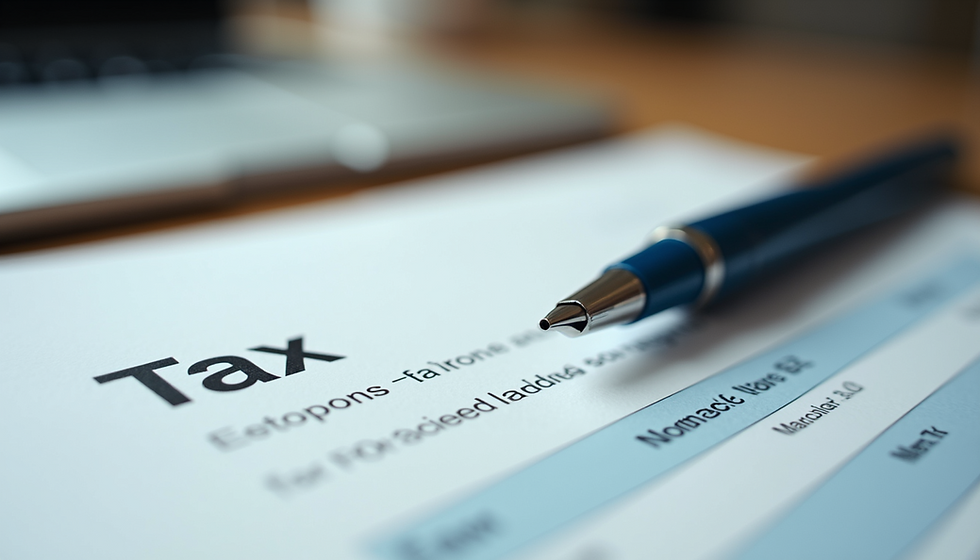Tax Trouble Ahead: Why Incomplete Returns and Poor Records Can Cost You
- Eduard husaru
- Jul 22, 2025
- 3 min read
Updated: Nov 12, 2025
Filing your Self Assessment tax return might feel like a once-a-year chore—but if it’s rushed, incomplete, or based on patchy records, the consequences can be far more serious than a missed deadline. From HMRC penalties to lost tax relief, poor record-keeping and missing receipts can turn a simple mistake into a costly headache. Let’s break down the risks—and how to avoid them.
The Risks of Incorrect or Incomplete Tax Returns
Submitting a tax return with missing income, overstated expenses, or incorrect figures can trigger:
HMRC penalties ranging from 0% to 100% of the underpaid tax, depending on whether the error was careless or deliberate.
Interest charges on any unpaid tax.
Loss of credibility with HMRC, especially if errors are repeated.
Investigations or compliance checks, which can be time-consuming and stressful.
Even innocent mistakes—like forgetting to include PayPal income or misclassifying expenses—can lead to penalties if HMRC believes you didn’t take “reasonable care.”
Poor Record-Keeping: The Silent Saboteur
Many sole traders struggle with:
Inconsistent tracking of income and expenses.
Missing receipts or invoices for claimed deductions.
Relying on memory or bank statements alone.
HMRC expects you to keep accurate records for at least 5 years after the 31 January deadline for each tax year. If your records are incomplete:
You could face fines of up to £3,000.
HMRC may disallow expense claims, increasing your tax bill.
You’ll struggle to defend yourself in case of an audit or investigation.
Missing Invoices and Receipts: What’s the Big Deal?
Receipts and invoices are your proof of business expenses. Without them:
HMRC may reject your expense claims, even if the costs were legitimate.
You risk overclaiming or underclaiming, which can trigger penalties.
You lose the ability to justify your tax position if challenged.
Bank statements alone aren’t enough—they show that you spent money, but not what you spent it on. That’s why HMRC insists on proper documentation.
Real-World Repercussions
Here’s what can happen if your return is incomplete or your records are poor:
Careless errors: Penalties of 15–30% of the underpaid tax.
Deliberate errors: Penalties of 35–70%.
Deliberate and concealed errors: Penalties of 50–100%.
Loss of tax relief: Missed deductions due to lack of evidence.
Cash flow strain: Unexpected tax bills and interest charges.
Reputation damage: Especially if you’re applying for a mortgage or loan.
How to Stay Compliant and Confident
To stay compliant and confident in your tax filing, consider these steps:
Keep digital and physical records of all income and expenses.
Scan and store receipts using apps like Dext or your accounting software.
mileage, home office use, and business travel consistently.
File early to avoid last-minute mistakes.
authorised agent—like Accounted 4 Tax Ltd—to ensure accuracy and peace of mind.
Understanding Tax Relief and Deductions
Tax relief and deductions play a crucial role in reducing your tax liability. Understanding what qualifies for tax relief can save you money. Common deductions include:
Business expenses: Costs incurred in the course of running your business.
Travel expenses: Costs related to business travel, including mileage and accommodation.
Home office expenses: A portion of your home expenses if you work from home.
By keeping thorough records of these expenses, you can maximise your tax relief and minimise your tax bill.
Final Thoughts
Tax returns aren’t just about numbers—they’re about trust, accuracy, and responsibility. At Accounted 4 Tax Ltd, we help sole traders and small business owners stay compliant, organised, and confident. Whether you’re filing for the first time or cleaning up past mistakes, we’re here to guide you every step of the way.
Need help reviewing your records or correcting a past return? Let’s chat.



Comments